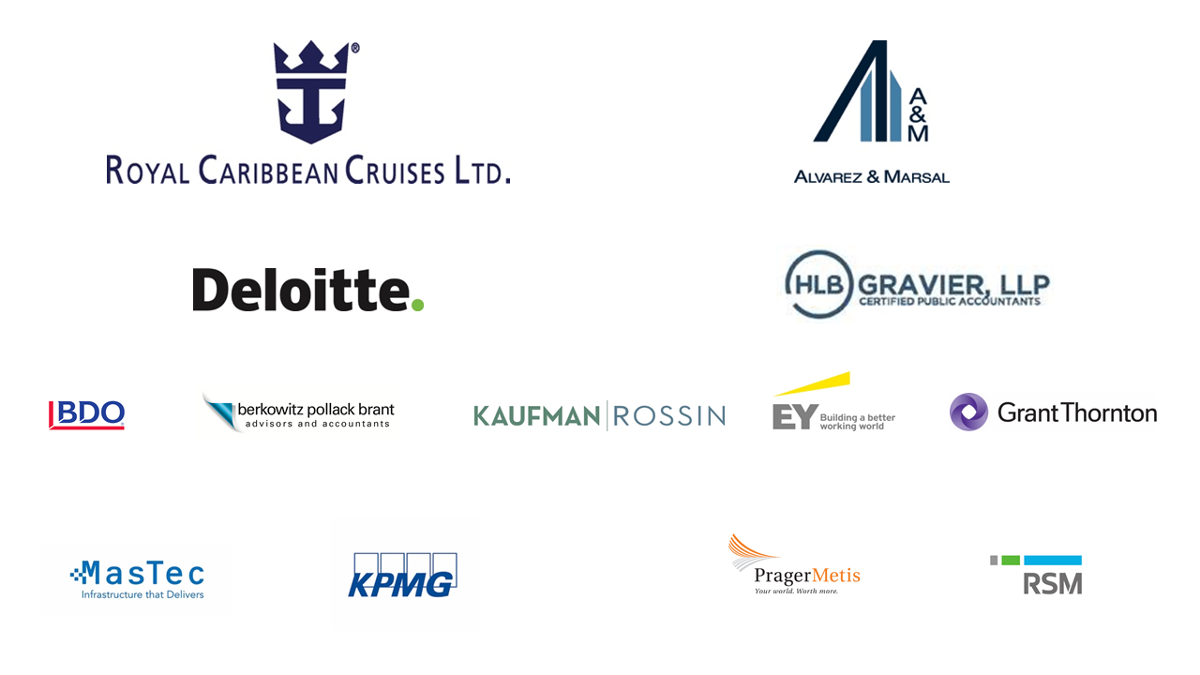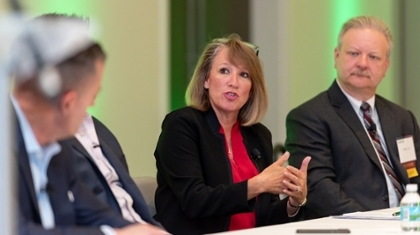More than 145 people attended the day-long ForUM, held May 17 at the University's Donna E. Shalala Student Center. "I'm delighted to see so many people here, both from the world of public accounting and from the corporate sector as well," Dean John Quelch, a veteran of many public company audit committees, said as the conference began. "The level of transformation in terms of digitalization, which is really the theme of this conference, is really impressive, and it calls upon the need for new ways of thinking and new disciplines and skills."
Indeed, digital transformation has proved disruptive in industries from transportation to grocery shopping. Steven Hill, KPMG LLP's global head of innovation, noted that, in the company's newest survey of CEOs, 63% say they are actively disrupting their sectors. This is the first time that more than half of CEO's are "on offense," Hill said.
In discussing digital transformation, ForUM speakers spent much of their time talking about people, rather than technology. Hill noted that most of the CEOs KPMG talks with are very concerned about culture and how their workforce is adapting to technology. Successful digital transformation, he said, is about more than just getting the technology right – companies must determine what organizational capital they need to make the transformation real.
For instance, with various forms of technology able to review and analyze transactions and other financial data more quickly and accurately than humans can, accountants and auditors have the opportunity to offer higher-level value to their clients, said John Farrell, KPMG LLP's chief innovation officer for audit. Hill added that "How we collect data, how we aggregate data, how we put data into analysis, is going to change very quickly – and I mean in the next two to three years." As computing power and big data move auditing from humans conducting sampling and testing to 100% machine review of data for anomalies, accountants and auditors must demonstrate their value through industry-specific expertise and the ability to use large volumes of data to maximize insights and benchmarking opportunities.
“A lot of clients see us as a commodity, but having all that data, we’re able to shift from being a service provider to a business advisor,” said David Vidal, assurance senior manager of EY. He says EY brings tremendous value by understanding the data even better than their clients do.
The SEC’s chief economist and director of its Division of Economic Risk & Analysis, S.P. Kothari, agreed. “The focus of accountants and auditors may have to shift to ascertaining the reliability and integrity of the underlying systems put in place to verify data accuracy. They’ll move up the food chain,” he said. “It’s about judgment – the ability of the auditors to exercise judgment to ascertain whether or not some of the information that the manager has prepared is reliable, accurate, or tainted by conflicts of interest.”
More broadly, participants throughout the ForUM said, the accounting workforce of the future will need both highly technical and soft skills, including:
- Investigative skills
- Analytical skills
- Critical thinking and reasoned judgment
- The ability to evolve with the profession and its tools
- An innovative mindset
- The ability to dive into data
- Face-to-face and written communication skills
In addition to discussing digital transformation, sessions at the ForUM discussed tax updates, including new revenue recognition rules and new final qualified business income (QBI) regulations, which were just issued in April, despite applying to tax returns for 2018 (filers have a year to amend their 2018 returns). They also delved into new tax laws that apply to U.S. multinationals, including Global Intangible Low-Taxed Income (GILTI) and Foreign-Derived Intangible Income (FDII) provisions. And, they discussed state laws surrounding the collection of sales tax by out-of-state businesses, which nearly every state has now enacted. Many of these laws are already effective, and others will become effective at the end of this year. Companies must understand whether they have an obligation to pay taxes in any state in which they operate, as well as the tax collection and payment rules for each jurisdiction.
Accounting Awards and Honors
One of the highlights of the ForUM was the Department of Accounting's annual awards and honors presentation. Dr. Olga Quintana, associate professor of accounting, received the Faculty of the Year award. Dr. Oscar Holzmann sent a written tribute to Quintana, whom he said had "dedicated much of her time to guiding the personal, in addition to the professional, development of her students. ... Students love her and trust that, while demanding a high level of performance, she always intends to deal with them fairly, and, if possible, with a great deal of humor and wisdom.
The department's Alumnus of the Year award was presented to Leonardo "Lenny" D. Gravier (MPRA ’87) by Miami Business School Marketing Professor Arun Sharma. Gravier is managing partner of 150-person audit, tax and advisory firm HLB Gravier. "He exemplifies What we want in a graduate," Sharma said of Gravier. "He has a curiosity and a dedication to the discipline and to his clients. ... That is something we can all learn from." In accepting the award, Gravier said thanked several of the faculty members who had influenced his education and life. "This university turned me into the person that I am today. The university is about a building, real estate, there's money involved, but what changed me are the professors," he said. "These are the true rock stars: the professors ... who are able to take a misguided child, a kid, and turn him into a man that will eventually become successful."
From the awards and honors and keynote speakers, to panel forums and multiple networking opportunities, participants kept up a lively discussion with presenters and among themselves. “UM Accounting showed once again its focus, insight and collaboration between academia and the business community,” said Madeline Elias (BS ’95, MBA Tax ’96), BDO USA LLP tax partner and South Florida tax market leader, and a member of the Accounting Advisory Board. “Leaders shared their thoughts and perspective on various relevant and current issues facing businesses today. As a UM alumnus and business leader, it was a pleasure to be part of this successful event.”

The 2019 Miami Business ForUM was sponsored by Alvarez Marsal, BDO, Berkowitz Pollack Brant, Deloitte, EY, Grant Thornton, HLB Gravier, Kaufman Rossin, KPMG, MasTec, Prager Metis, Royal Caribbean Cruises Ltd., RSM.

